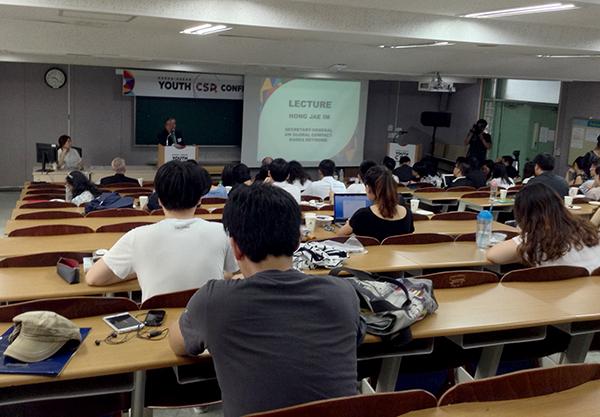Deans looking to increase their international partnerships will be asked to collaborate more on where their schools plan to grow ties – with a focus on boosting GW’s strongest existing connections.
The decision marks the first time deans are coming together to plot an overarching, University-wide strategy for international growth. The dean’s council prioritized the issue this fall during its regular meetings.
School leaders need to compare their strongest programs and discuss each of their own priorities to plan how schools can increase recruiting, create new programs or launch new partnerships around the world, Provost Steven Lerman said.
“Different schools have different opportunities internationally and different priorities, and in some cases they have different strengths in different regions,” he said. “And so each school will have to work under the umbrella of the strategic plan strategy on international to figure out what works best.”
As officials look to strengthen partnerships, Lerman said there is some need to narrow down the number of them and see how schools can partner with the same institutions. GW has dozens of partnerships across its schools, and has partnered with hundreds of institutions for study abroad programs.
“I’d like to see more of that: identifying of very high-quality partners and where it makes sense to have multiple schools try to build partnerships with those partner institutions, rather than have every school create its own partnership where there’s not necessarily any overlap,” he said.
That will help GW meet one of its financing goals for the strategic plan, which was approved in 2013. The decade-long blueprint outlines cutting study payments to providers and reducing other administrative costs as a way to save $900,000 a year.
GW has created strong programs in countries like China, where the School of Business has several joint degree programs. GW also has established relationships across Europe, where many students study abroad.
But Lerman said he hopes the University can expand on partnerships like the GW Law School’s in India and the School of Engineering and Applied Science’s in South Korea.
Jean Johnson, dean of the School of Nursing, said schools like nursing, medicine and public health should look to launch strategic partnerships internationally that support global health. At this time, those schools have independent partnerships in places like Haiti, African nations and South Korea.
Across GW, there are bound to be many types of relationships, she said, adding that the University should also look to partner with countries to help bring more students to Foggy Bottom.
“We want to be able to continue that work and research, partner with academic institutions in developing countries, but also work with countries where students can afford to come to the U.S., or the government helps the students come to the U.S.,” she said.
More universities are looking to create comprehensive strategies for programming abroad, said Noah Sobe, an associate professor at the Loyola University of Chicago School of Education, who specializes in the internationalization of higher education. He added that it can be easier for an institution to create a new program from an existing one.
“One of the things that you see a lot of universities doing is leveraging their overseas program, whether its an office or an initial relationship with an institution, using that and expanding from there,” he said.
In some schools, like the Milken Institute School of Public Health, many faculty members have colleagues who they work with around the world. Dean Lynn Goldman said creating more formal partnerships with foreign institutions was one area the school could look to strengthen.
“It’s fair to say that a lot of it has been based on one-on-one relationships,” she said.
James Tielsch, the chair of the global health department, said most of a school’s international partnerships begin with those relationships.
“A lot of it starts with a personal connection or collaboration,” he said. “They develop a relationship. They will collaborate on research, educational programs and things like that. Sometimes it can grow into something bigger.”
For the past few years, administrators focused their international programming on China, where they had hoped to open a branch campus. After scaling back those aspirations last winter, administrators have stressed their interest in expanding partnerships in countries like India and South Korea.
Administrators are also looking to finally launch the undergraduate global degree program that was first floated about three years ago. The Columbian College of Arts and Sciences has spent several years planning the program.
To allow students to have more flexibility in where they go abroad as part of that program, GW will need to strengthen study abroad partnerships across the globe.
And by creating a more comprehensive strategy for international programming, officials could avoid a confrontation with faculty, who objected to being left out of conversations about launching a branch campus in China last year.
Eddie West, the director of international initiatives at the National Association for College Admission Counseling, said having an entire institution behind an international project can make give it more impact.
Faculty and staff working internationally typically need to know about the university’s activities outside of their own office or department, and some institutions have created senior leadership positions for growing international strategy, he said.
“GW’s experience shows schools really have to go into such ventures thoughtfully and in a coordinated manner,” he said. “If you don’t have institution-wide support for these kinds of things, the likelihood of this succeeding long term is pretty low.”







